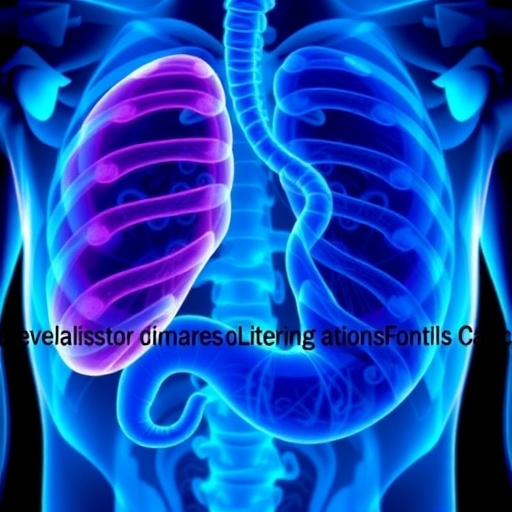In a groundbreaking study poised to shift the paradigm in gastric cancer therapeutics, researchers have unveiled a novel strategy to overcome drug resistance that has long challenged oncologists worldwide. Gastric cancer, known for its aggressive nature and poor prognosis, often develops resistance to frontline chemotherapeutic agents such as paclitaxel, rendering treatment regimens ineffective and leaving patients with scant options. The latest research illuminates how carvedilol, a commonly prescribed beta-blocker primarily used for cardiovascular diseases, could resensitize paclitaxel-resistant gastric cancer cells, sparking new hope for improved clinical outcomes.
This pioneering investigation focused on the AGS cell line, a model for human gastric adenocarcinoma, notorious for its recalcitrance against paclitaxel after prolonged exposure. By integrating carvedilol into the treatment protocol, the research team observed a significant reversal of drug resistance. The mechanistic underpinnings uncovered reveal carvedilol’s multifaceted interaction with key molecular signaling pathways that govern cellular survival and apoptosis, addressing a critical hurdle in chemotherapy resistance.
One of the most striking revelations of this study concerns carvedilol’s modulation of apoptotic regulators. Apoptosis, or programmed cell death, is essential for eliminating cancerous cells, and its dysregulation often contributes to chemoresistance. The research demonstrated that carvedilol influences an array of apoptotic proteins, tipping the balance toward cell death in otherwise resistant cancer cells. This reactivation of the apoptotic machinery is central to restoring sensitivity to paclitaxel, reflecting carvedilol’s potential to enhance chemotherapeutic efficacy.
.adsslot_dyjiSIvozr{width:728px !important;height:90px !important;}
@media(max-width:1199px){ .adsslot_dyjiSIvozr{width:468px !important;height:60px !important;}
}
@media(max-width:767px){ .adsslot_dyjiSIvozr{width:320px !important;height:50px !important;}
}
ADVERTISEMENT
Beyond apoptosis, the study delved into carvedilol’s effect on the Notch signaling pathway, a critical regulator of cell fate decisions and tumor progression. Aberrant Notch signaling has been implicated in the maintenance of cancer stem cells and resistance to chemotherapy. Interestingly, carvedilol treatment downregulated components of the Notch pathway in paclitaxel-resistant AGS cells, thereby attenuating their survival advantage. This finding highlights that carvedilol’s anticancer properties extend beyond its classical beta-adrenergic receptor antagonism.
The investigative team also uncovered notable interactions with the PI3K/AKT pathway, a major intracellular signaling cascade that mediates growth, proliferation, and survival in cancer cells. Hyperactivation of PI3K/AKT contributes heavily to chemotherapy resistance by promoting cell survival and inhibiting apoptosis. Carvedilol’s ability to attenuate PI3K/AKT signaling disrupts this survival network, facilitating increased apoptotic sensitivity to paclitaxel. This dual modulation of apoptotic and survival pathways underscores the comprehensive impact carvedilol exerts on resistant cancer cells.
In parallel, alterations in the ERK1/2 signaling pathway were observed following carvedilol administration. ERK1/2, a component of the MAPK signaling family, is instrumental in cell growth and differentiation processes. Its dysregulation frequently correlates with tumor cell proliferation and resistance to anticancer drugs. The research revealed that carvedilol effectively downregulated ERK1/2 activity, aligning with decreased cellular proliferation and heightened susceptibility to paclitaxel-induced cytotoxicity.
Remarkably, this scientific effort also explored the regulatory role of miR-34a, a microRNA recognized for its tumor suppressor functions. MicroRNAs like miR-34a orchestrate gene expression post-transcriptionally and are critical modulators of cancer biology. The study found that carvedilol upregulated miR-34a expression in resistant gastric cancer cells, contributing to the suppression of oncogenic pathways and reinforcing the induction of apoptosis. This epigenetic influence broadens our understanding of how non-anticancer drugs can be repurposed for cancer therapy through subtle genomic regulation.
The translational implications of these integrated signaling modulations are profound. By employing carvedilol, an existing and well-characterized safe therapeutic agent, to overcome paclitaxel resistance, this approach offers a tangible pathway to augment standard chemotherapeutic protocols without necessitating entirely new drug development. This strategy could rapidly progress into clinical trials, leveraging carvedilol’s established pharmacological profile to expedite repositioning efforts in oncology.
Furthermore, the convergence of carvedilol’s effects on multiple pathways typical to cancer resilience underscores the importance of multi-targeted interventions. Single-pathway targeting often elicits compensatory survival mechanisms in tumor cells, but the broad-spectrum disruption documented here advocates for a paradigm shift toward combinatorial approaches that comprehensively disable cancer cell defenses. This insight may inform future drug design and combination therapy strategies.
This study also invites broader consideration of cardiovascular drugs as reservoirs of anticancer potential. The repurposing of beta-blockers, traditionally assigned to manage hypertension and heart failure, signals a promising niche in oncology pharmacotherapy. The pleiotropic effects observed open avenues for systematic screening of approved drugs for off-target benefits, significantly shortening the bench-to-bedside journey.
Challenges remain, of course, including verifying carvedilol’s effectiveness across diverse gastric cancer subtypes and patient-derived xenografts, as well as assessing its impact in vivo amidst the intricacies of tumor microenvironments. Clinical trials will need to carefully balance carvedilol’s pharmacodynamics with chemotherapy schedules to maximize synergistic cytotoxicity while safeguarding patient safety.
As our comprehension of cancer signaling pathways deepens and computational biology advances, mapping precise drug-pathway interactions will become increasingly sophisticated. This study exemplifies such progress, marrying molecular biology and pharmacology to unlock unforeseen therapeutic opportunities. The convergence of carvedilol’s cardiological origins with oncologic efficacy underscores the serendipitous potential embedded within existing pharmacopoeias.
Overall, this research not only enhances our armamentarium against gastric cancer but also invigorates research enthusiasm for drug repurposing strategies. It demonstrates that overcoming chemoresistance is achievable through molecularly informed, strategic pharmacological interventions that repurpose familiar molecules for novel clinical frontiers.
Subject of Research: The effect of carvedilol on paclitaxel-resistant gastric cancer AGS cells focusing on apoptotic regulators, Notch, PI3K/AKT, ERK1/2 signaling pathways, and miR-34a expression.
Article Title: Carvedilol sensitizes paclitaxel-resistant gastric cancer AGS cells to paclitaxel: influences on apoptotic regulators, Notch, PI3K/AKT, ERK1/2 signaling pathways, and miR-34a expression.
Article References:
Niapour, A., Hosseinzadeh, S., Mohebi, Y. et al. Carvedilol sensitizes paclitaxel-resistant gastric cancer AGS cells to paclitaxel: influences on apoptotic regulators, Notch, PI3K/AKT, ERK1/2 signaling pathways, and miR-34a expression. Med Oncol 42, 392 (2025). https://doi.org/10.1007/s12032-025-02966-0
Image Credits: AI Generated
Tags: AGS cell line studyapoptosis modulation by carvedilolbeta-blockers in oncologyCarvedilol in gastric cancer treatmentchemotherapeutic agents for gastric adenocarcinomaclinical outcomes in resistant gastric cancerenhancing chemotherapy efficacyinnovative cancer treatment approachesmolecular signaling pathways in cancernovel strategies in cancer therapeuticsovercoming drug resistance in cancerpaclitaxel resistance reversal





